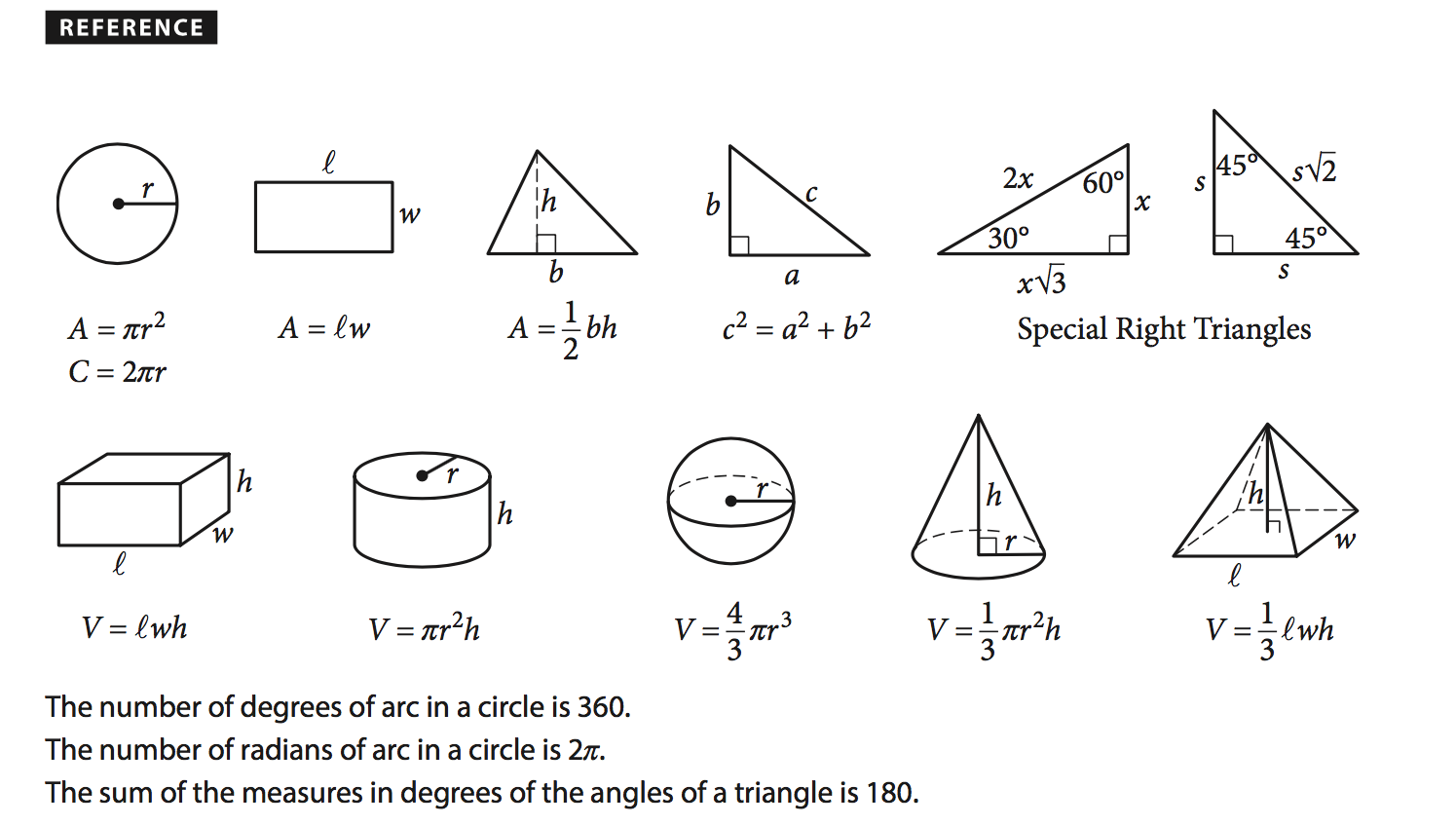9713. Common Math FormulasMath Formulas
Common math formulas.
1. Geometry

1.1 Perimeter
| Shape | Formula | Explanation |
|---|---|---|
| Square | $P = 4a$ | where a = any edge |
| Rectangle | $P = 2l + 2w$ | where l = length and w = width |
| Triangle | $P = a + b + c$ | where a = side, b = base, and c = side |
| Circle | $P = {\pi}d$ or $P = 2{\pi}r$ | where $\pi$ = 3.14, d = diameter and r = radius |
1.2 Area
| Shape | Formula | Explanation |
|---|---|---|
| Square | $A = a^2$ | where a = any side of the square |
| Rectangle | $A = lw$ | where l = length and w = width |
| Parallelogram | $A = bh$ | where b = base and h = height |
| Triangle | $A = \frac{1}{2}bh$ | where b = base and h = height |
| Triangle | $A = \vert \frac{(A_x(B_y-C_y) + B_x(C_y-A_y)+C_x(A_y-B_y)}{2}\vert$ | where ($A_x$,$A_y$) are the x and y coordinates of the point A, etc. |
| Circle | $A = \pi r^2$ | where $\pi$ = 3.14 and r = radius |
| Trapezoid | $A = \frac{a + b}{2}h$ | where a = top base, b = bottom base, and h = height |
| Sphere | $S = 4{\pi}r^2$ | where S = surface area, $\pi$ = 3.14 and r = radius |
| Cube | $S = 6a^2$ | where a = any edge |
| Cylinder | $S = 2{\pi}rh$ | where $\pi$ = 3.14, r = radius, and h = height |
1.3 Volume
| Shape | Formula | Explanation |
|---|---|---|
| Cube | $V = a^3$ | where a = any edge |
| Rectangular Container | $V = lwh$ | where l = length, w = width, and h = height |
| Square Pyramid | $V = \frac{1}{3}b^2h$ | where b = base length, h = height |
| Cylinder | $V = πr^2h$ | where $\pi$ = 3.14, r = radius, and h = height |
| Cone | $V = \frac{1}{3}\pi r^2h$ | where $\pi$ = 3.14, r = radius, and h = height |
| Sphere | $V = \frac{4}{3}\pi r^3$ | where $\pi$ = 3.14, r = radius |
| Right Circular Cylinder | $V = \pi r^2h$ | where $\pi$ = 3.14, r = radius, and h = height |
2. Trigonometry

| Function | Formula |
|---|---|
| Sine | $\sin\theta=\frac{opposite}{hypotenuse}$ |
| Cosine | $\cos\theta=\frac{adjacent}{hypotenuse}$ |
| Tangent | $\tan\theta=\frac{opposite}{adjacent}$, or $\tan\theta=\frac{\sin\theta}{\cos\theta}$ |
| Cosecant | $\csc\theta=\frac{1}{\sin\theta}$ |
| Secant | $\sec\theta=\frac{1}{\cos\theta}$ |
| Cotangent | $\cot\theta=\frac{1}{\tan\theta}$, or $\cot\theta=\frac{\cos\theta}{\sin\theta}$ |
| Equation | ${\sin}^2\theta+{\cos}^2\theta = 1$ |
3. Formulas/Equations
| Title | Formula | Explanation |
|---|---|---|
| Distance between two points | $d=\sqrt{(x_2-x_1)^2+{(y_2-y_1)^2}}$ | where ($x_1$,$y_1$) and ($x_2$,$y_2$) are two points on a coordinate plane |
| Slope of a line | $m=\frac{y_2-y_1}{x_2-x_1}$ | where ($x_1$,$y_1$) and ($x_2$,$y_2$) are two points on a coordinate plane |
| Equation of a line | $y=mx+b$ | where m is the slope and b is the y-intercept |
| Quadratic Equation | $ax^2+bx+c=0$ | where a and b are coefficients and c is constant |
| Quadratic formula | $x={-b\pm \sqrt{b^2-4ac}\over 2a}$ | where a and b are coefficients and c is constant |
| Equation of a circle | $(x-h)^2+(y-k)^2=r^2$ | where r is the radius and (h, k) is the center |
| Logarithm Equation | $\log_{b}x=y$, $b^y=x$ | |
| Logarithm Equation | $log_{b}xy=log_b{x}+log_{b}y$ | |
| Logarithm Equation | $log_{b}\frac{x}{y}=log_b{x}-log_{b}y$ |
4. Algebraic Rules
| Title | Formula | Explanation |
|---|---|---|
| Product Rule | $ a^n \times a^m = a^{n+m}$ | where a is the base, n and m are the exponents |
| Power Rule | $ (a^n)^m = a^{nm}$ | where a is the base, n and m are the exponents |
| Quotient Rule | $ \frac{a^n}{a^m} = a^{n-m}$ | where a is the base, n and m are the exponents |
| Negative Exponent | $ a^{-n} = \frac{1}{a^n}$ | where a is the base, n is the exponent |
5. Formulas
5.1 Sum of Integers 1 through N
If
\[S_n=1+2+3+...+n\]then reverse the series and rewrite that as
\[S_n=n+(n−1)+(n−2)+...+1\]Adding the two together
\[2S_n=n(n+1)\]or
\[S_n=\frac{n(n+1)}{2}\]5.2 Sum of Powers of 2
\[S_n=2^0+2^1+2^2+...+2^n=2^{n+1} - 1\]Proofs: Look at these values in binary way.
| Power | Binary | Decimal |
|---|---|---|
| $2^0$ | 000001 | 1 |
| $2^1$ | 000010 | 2 |
| $2^2$ | 000100 | 4 |
| $2^3$ | 001000 | 8 |
| $2^4$ | 010000 | 16 |
| $2^5$ | 100000 | 32 |
Example 1:
\[S_3=2^0+2^1+2^2+2^3 = 1111(Binary) = 2^{3+1} - 1\]Example 2:
\[S_5=2^0+2^1+2^2+...+2^5 = 111111(Binary) = 2^{6+1} - 1\]5.3 Permutation and Combination
Permutation:
\[P(n,r)=\frac{n!}{(n-r)!}\]Example: Choose 2 numbers from array [1,2,3,4], return the total number of all possible permutations.
\[P(4,2)=\frac{4!}{(4-2)!}=\frac{4!}{(2)!}=\frac{24}{2}=12\]Combination:
\[C(n,r)=\frac{n!}{r!(n-r)!}\]Example: Choose 2 numbers from array [1,2,3,4], return the total number of all possible combinations.
\[C(4,2)=\frac{4!}{2!(4-2)!}=\frac{4!}{2!(2!)}=\frac{24}{2*2}=6\]